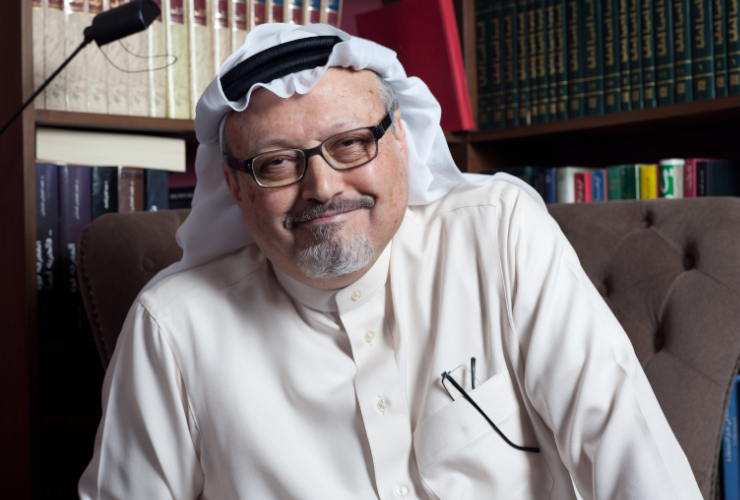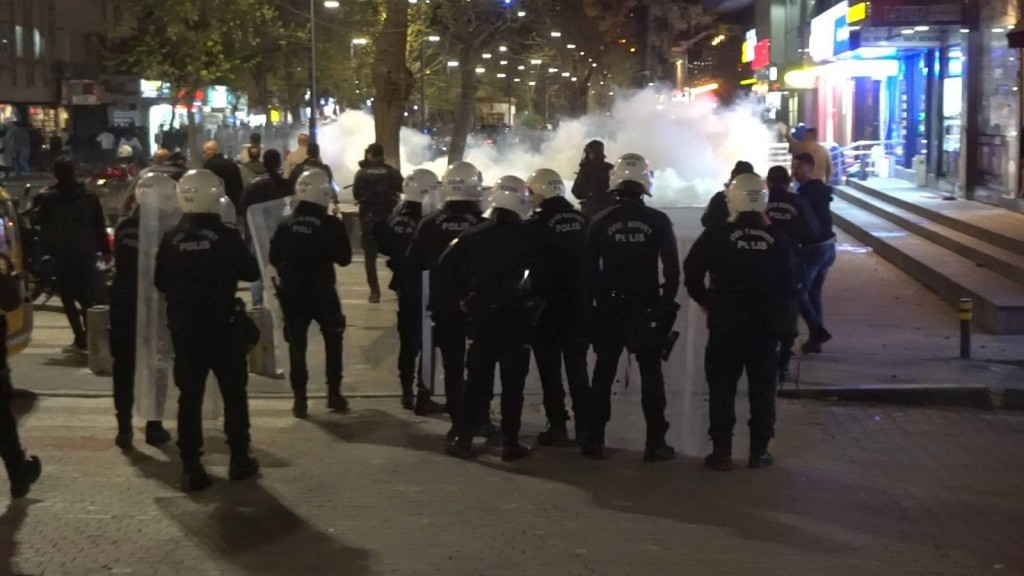The date was October 2, 2018. It was an ordinary business day in Istanbul. Suddenly, my phone rang while I was sitting at my table in the office of the newspaper I was working for, Hürriyet which was once upon a time called the “admiral ship of the media.” The person on the other side of the phone was telling me that a Saudi journalist went missing after he entered the Saudi Arabia consulate in İstanbul and there was no news whatsoever from him for hours. This was one of the weirdest things that I have ever heard. At the end of the day, it was a diplomatic mission, right? What could have happened to him?
With my journalistic impulse, I immediately went to the Saudi Arabian consulate building which was located in the Levent district of Istanbul. Of course, they didn’t let me in. After a while, the front door started to get crowded. Turkish, Arab and Western journalists from various media outlets were gathering in front of the consulate. Khashoggi’s fiancée, Hatice Cengiz, was also waiting there anxiously. I saw Turan Kışlakçı, who was Khashoggi’s friend as well as president of the Turkish-Arab Media Association. Kışlakçı told me, “We have been waiting in front of the consulate for hours. We are following the people who are going inside and coming out. Khashoggi was not let out, I don’t know if there is a tunnel inside the consulate or if they took him somewhere else from a tunnel, but we are 99 percent sure that he is being kept inside the consulate building.”
In the following days, journalists and NGOs organized protests and demonstrations in front of the Saudi consulate in order to make them let Khashoggi out. However, all the efforts were useless, they were waiting in vain… The fact was: Washington Post columnist Jamal Khashoggi had entered the Saudi consulate in İstanbul at around 1pm on October 2 in order to collect marriage documents and he would never been seen alive again.
He was dismembered inside the consulate
It was very hard to believe, but they had literally exterminated an international journalist inside a diplomatic mission in the middle of İstanbul in the 21st century. Khashoggi’s body was never found, because as the Turkish prosecutor pointed out in the indictment, “the body of the person who was murdered had been dismembered and taken out of the consulate building by the people who committed the murder.” (It has been mentioned several times in the indictment that parts of Khashoggi’s body were carried to the car inside the plastic bags.)
The murder of Khashoggi sparked international outrage and anger. The revelations made by several Turkish and American authorities implicated the crown prince of Saudi Arabia, Mohammed bin Salman, (known as MBS), as the instigator who ordered the murder of Khashoggi, who was known as a critical opponent of MBS’ policies in the Kingdom.
One year and eight months have passed since then. If we don’t count the trial in Saudi Arabia, which was described by the U.N. Special Rapporteur Agnes Callamard (who authored an inquiry into Khashoggi’s death) as “a mockery of justice”, the murder trial of Jamal Khashoggi began in Istanbul on July 3.
There was a big interest from the international media at the trial. Foreign observers, including Callamard, were also ready at the court to observe the hearing.
The first person to appear and take the floor was Khashoggi’s fiancée, Hatice Cengiz, who was involved in the case as ‘complainant.’ Cengiz said she waited around 3- 3.5 hours for Khashoggi at the front door of the consulate after he entered the building. Eventually, she went to the Turkish police waiting at the consulate door and told him that Khashoggi has not come after 3.5 hours. “I realized that (the Turkish police) did not know anything about him, so I called the consulate. The person on the phone asked me who was calling. And I replied as ‘I am his fiancée.’ The person on the phone told me that Jamal left and he also told me to stay where I was.”
‘They asked me to light up the tandoor’
After Cengiz, Khashoggi’s close friend and former AK Party MP Yasin Aktay, as well as workers at the consulate, drivers of the consul-general, etc. all testified.
During his testimony, the driver of then-Consul-General Mohammad al-Otaibi, Emrullah Öz, said that Saudi authorities at the consulate told him, other drivers and the gardeners not to go to the residence of the consul-general on the day that Khashoggi was murdered. “They said engineers were going to go to the residence that day and therefore there was no need for us to go.”
The most striking amongst all the testimonies was the testimony given by Zeki Demir, a technical worker who used to work at the Saudi consulate back-then:
“I was sitting at the drivers’ room at the consulate. Then my phone rang, they told me that the engineers were at the consul-general’s residence, and they called me to go to the residence. I immediately went. There were Saudi people from outside the consulate. They wanted me to light up the tandoor which was in the garden. There was a panic atmosphere. It looked like they wanted me to leave right away. I lit up the tandoor. I even joked by saying that ‘If you fall into this tandoor, then you will turn into kebab. Then they told me ‘Ok, you are done, you can leave’, I left.”
Was his body burned out at the tandoor?
At that point, most people at the courtroom remembered the images that were revealed in 2018 and showing the parts of Khashoggi’s body being carried to Consul General Al Otaibi’s residence with cases. According to a previous intelligence report that was written by the Turkish police and leaked by several Turkish newspapers, it was written that Khashoggi was killed by a Saudi execution team of 15 people, his body was dismembered by this team and then parts of his body were put in five different cases and they were taken to the residence of the consul-general with a minibus.
The possibility of Khashoggi’s body parts to be burned out at the tandoor was officially mentioned at the police report previously prepared by the Istanbul police department. If this possibility is true, then one of the most brutal murders in the civilized world was committed in a posh neighbourhood, in the middle of one of the biggest metropoles of the world.
There was a posh meat restaurant just next to the Saudi consul general’s residence in Levent. Imagining that a human’s body parts were burned in a tandoor next door while the customers were eating their meats at this posh restaurant in this posh neighbourhood is a sort of scenery that you can’t even think of even in the most frightening scary movies.
Thus, U.N. Rapporteur Agnes Callamard, who attended the trial as an international observer, also underlined the “tandoor” detail during her press release after the first hearing of the trial. Although this information was mentioned in the indictment, it was shocking for many people to hear these from the first-hand accounts of the witnesses at the court.
Certainly, regional conflicts and disagreements between Turkey and Saudi Arabia such as Qatar crisis, supporting different sides in Egypt, etc. also play a part in the fact that Turkey is advancing towards this murder case. However, as the colleagues of Khashoggi and advocates of the justice, this side of the murder case is not our concern. What concerns us is for the truth to come out as soon as possible and for all those responsible from the bottom to the top to be identified and punished. You can either share Khashoggi’s ideas or you can entirely oppose his ideas, however if we identify ourselves as the defenders of journalism, we have to advocate for this case. To help make sure that no state will be able to slaughter a journalist freely like this ever again.





